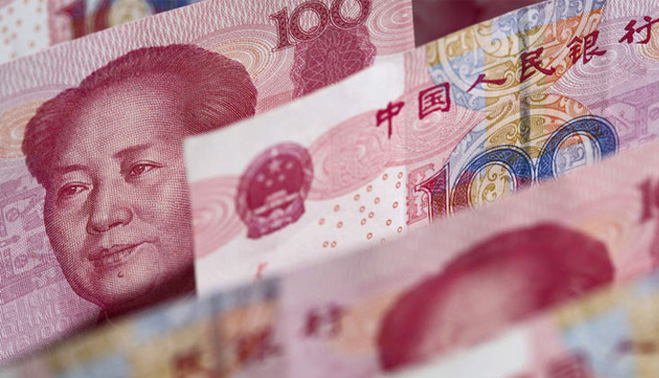![]() Home > World Business
Home > World Business
China Traders Flee To Hong Kong In Record Stock-Buying Streak

![]() April 7th, 2016 | 08:51 AM |
April 7th, 2016 | 08:51 AM | ![]() 1666 views
1666 views
Hong Kong
Cash is pouring into Hong Kong stocks from across the mainland border.
Chinese investors have been net buyers of the city’s shares for 104 consecutive trading days, sinking 43.8 billion yuan ($6.8 billion) into equities from October through Tuesday, according to data compiled by Bloomberg tracking investments via the exchange link with Shanghai. Mainland traders have now put more money into Hong Kong than global asset managers have invested in Shanghai, a reversal of flows in the link’s first year, the data show.
As concern persists about a further slide in the yuan, Chinese investors are piling into cheaper shares across the border that have lagged behind mainland counterparts for years. While the flows are small relative to estimates of the record capital flight from China in 2015, they’re another sign of what’s at stake for policy makers seeking to stabilize the currency and stem outflows by providing credible investment options at home.
“In China, there is talk of an asset drought -- people don’t find domestic assets particularly attractive,” said Tai Hui, the Hong Kong-based chief Asia market strategist at JPMorgan Asset Management. “They are investing overseas in any way possible including via the southbound stock connect.”
Buying mainland Chinese stocks has been a losing proposition this year, with the benchmark Shanghai Composite Index down 14 percent. Other investment alternatives such as property are coming under scrutiny as authorities impose fresh curbs after home prices jumped in the biggest cities such as Shanghai and Shenzhen.
Cheap Valuations
While Hong Kong’s Hang Seng Composite Index is down 8.1 percent in 2016, that hasn’t deterred mainland investors. They utilized part of their 10.5 billion yuan daily quota for link purchases each day from Oct. 28 through April 6, the longest such streak since the mutual access program began in November 2014. In comparison, northbound flows, which reflect foreigners buying Shanghai-traded shares, have only picked up since late February.
Valuations on mainland companies listed in Hong Kong plunged to a record low in February before rebounding as the yuan stabilized, central banks around the world took steps to boost stimulus and commodity prices rallied. Even after entering a bull market last week, the Hang Seng China Enterprises Index trades at 6.8 times estimated earnings, at least 35 percent below its 10-year average and the current multiple on Shanghai’s gauge.
Dual-listed shares are 39 percent more expensive on the mainland, according to the Hang Seng China AH Premium index, which rose to a six-week high on Tuesday. The valuation gap has been a catalyst for Chinese investors to buy Hong Kong stocks, and they’re also seeking a hedge against a weaker yuan, said Mark Jolley, equity strategist at CCB International Securities Ltd. in Hong Kong.
Yuan Outlook
The yuan will slide 3.3 percent versus the dollar by year-end, a survey of strategists showed, with Citigroup Inc. forecasting a more than 7 percent slide through 2017. The Hong Kong dollar, the underlying currency for shares listed in the city, is pegged to the greenback.
“Yuan depreciation is the main reason," said Daniel So, strategist at CMB International Securities Ltd. in Hong Kong. “If they simply want to avoid yuan depreciation, they should buy stocks with little mainland business such as HSBC or pure Hong Kong local plays. But it seems many of the actively traded stocks by southbound money are mainland companies.”
Most Popular
HSBC Holdings Plc has been the most popular Hong Kong stock with investors since the start of the link program, according to Jefferies Group LLC. The rest of the top 10 were Chinese companies, including dual-listed Industrial & Commercial Bank of China Ltd. and Alibaba Pictures Group Ltd., according to the brokerage. ICBC’s A shares trade at a 25 percent premium to their Hong Kong counterparts.
While concern for a weaker yuan is prompting investors to divest their holdings, Hong Kong equities aren’t immune to a falling Chinese currency. Because many companies listed in the city derive the bulk of their sales from China, a depreciating yuan reduces the value of their profits when translated back into Hong Kong dollars.
The total holdings of Hong Kong stock purchases through the link has increased to about 133 billion yuan, taking up more than half of the total available quota, exchange data show. Foreign investors held about 126 billion yuan in Shanghai-listed shares purchased through the stock connect.
“The connect program is one of the few remaining legitimate channels to buy shares offshore at a discount," said Hao Hong, chief China strategist at Bocom International Holdings Co. in Hong Kong, about why Chinese investors have been moving money across the border. “This is consistent with the directions of global fund flow in recent weeks, and is supportive for Hong Kong shares."
Source:
courtesy of BLOOMBERG
by Bloomberg News
If you have any stories or news that you would like to share with the global online community, please feel free to share it with us by contacting us directly at [email protected]